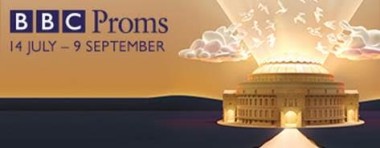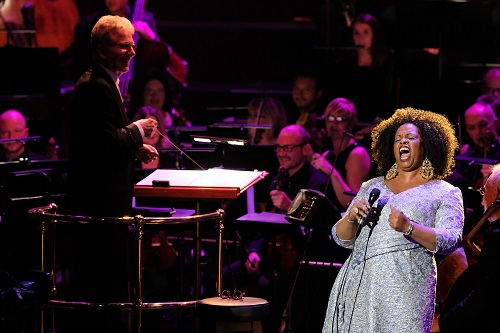
 United Kingdom 2017 BBC PROMS 27 – Ella and Dizzy: A Centenary Tribute: Dianne Reeves (singer); James Morrison (trumpet); Victor Sangiorgio (piano); James Morrison Trio (William Morrison, guitar; Patrick Danao, drum kit; Harry Morrison, bass); BBC Concert Orchestra / John Mauceri (conductor). Royal Albert Hall, London, 4.8.2017. (CC)
United Kingdom 2017 BBC PROMS 27 – Ella and Dizzy: A Centenary Tribute: Dianne Reeves (singer); James Morrison (trumpet); Victor Sangiorgio (piano); James Morrison Trio (William Morrison, guitar; Patrick Danao, drum kit; Harry Morrison, bass); BBC Concert Orchestra / John Mauceri (conductor). Royal Albert Hall, London, 4.8.2017. (CC)

(c) BBC/Mark Allan
Gershwin – Manhattan Rhapsody. A Foggy Day (arr. Mendoza). Embraceable You; Fascinatin’ Rhythm (both arr. Childs)
Ray Noble – Cherokee (arr. James Morrison)
Thelonius Monk – ‘Round midnight (arr. Chindamo)
Ellington – Harlem (arr. Henderson)
Lecuona – Jungle Drums (arr. Morton Gould)
Gillespie/Pozo/Fuller – Manteca
Ellington/Tizol – Caravan
Reeves/Midón – Tango du jour (arr. Goldstein)
Gillespie – A Night in Tunisia (arr. O’Boyle)
Shearing – Lullaby of Birdland (arr. Childs)
Both Ella Fitzgerald and Dizzy Gillespie were born 100 years ago, in 1917, so it was fitting they were paired in this fun, Proms version of “Friday Night is Music Night.” Intriguingly, Dianne Reeves has a connection with Ella; she worked the same club (although a different part of it) as Ella at weekends while she was in high school. Both Ella and Dizzy shared a passion for their music, of course, and in fact Ella even “did” bebop with Gillespie.
The evening started with Gershwin, with whom Fitzgerald is strongly associated. This was the first Proms performance of the Manhattan Rhapsody (1931), a score that originated in the 1931 film Delicious – it also had the titles of “New York Rhapsody” and “Rhapsody in Rivets”. It screams Gershwin tropes from each and every pore. The Proms booklet refers to this as the First Proms Performance; Mauceri in one of his many intros spoke of a “UK premiere.” Whatever, it is a lovely piece. Pianist Victor Sangiorgio sounded bass-light in his playing; the BBC Concert Orchestra itself played with huge aplomb.
So, it was to the first soloist, Dianne Reeves, taking an apt song given that the Foggy Day of the song’s title occurs in London Town. From an indeed misty opening, the performance opened out, Reeves finding that Fitzgerald scat and nailing it. Reeves entered after an orchestral introduction accompanied by (amplified) piano. I think we could have done without the dry ice (=fog) issuing forth in the RAH, though.
A rather bizarre link is that Englishman Ray Noble, who wrote the next piece, Cherokee, appeared in the film A Foggy Day as the character Reggie, the band leader. The astonishing Australian trumpeter James Morrison also arranged Cherokee in the “Dizzyfied” version heard on this particular evening. Morrison will never have a problem being heard against any orchestra in any space – his tone is clarion, he hits the notes right in the middle (no matter at what speed) and, quite simply, he plays loudly. He can also do those astonishingly high roulades – the crowd’s cheer after his break was testament as to how exciting that can be. Morrison was eight when he heard Gillespie for the first time – it was clearly love at first audition. The flip side of Morrison’s playing was on display in ‘Round Midnight, in a “full-blooded” (as the booklet phrased it) arrangement by Joe Chindamo. Morrison bends notes, sustaining a beautifully long line. Chindamo’s orchestration was simply beautiful, of gossamer delicacy.
The performance of Embraceable You (from Girl Crazy) was supplemented by Reeves’ long-time piano partner, Peter Martin, who played with superb clarity. There was certainly a discernible “ping” to the piano’s high notes in the hall. This song was a true Ella classic, and Reeves actually came across as very close in sound – her vocal range is similar to Ella’s, too (read huge). Finally, pre-interval, Duke Ellington’s orchestral Harlem (1951, revised 1963). This was heard in the Luther Henderson arrangement. It was a nice idea to have a long-form orchestral work balancing the Gershwin Rhapsody that started the event. A series of variations on the name “Harlem,” it features unashamedly flutter-tongued trumpets, a triple cadenza by the James Morrison Trio (featuring two “other” Morrisons, as it happens). Structural corners were very carefully and expertly negotiated by Mauceri. No missing the funeral march variation, with its bluesy notes and slow counterpoint.
Post-interval, the music moved to new territories, beginning with Ernesto Lecuona’s Jungle Drums (1933). Three drummers exchanged rhythms, spatially separated, leading to a piece full of sunshine and “easy” (in the sense of laid-back) rhythm. It was good to see both Morrison and Reeves onstage for Billy Childs’ arrangement of “Fascinatin’ Rhythm” from the 1924 musical Lady Be Good. Taking the original 2/4 piece and converting it into 5/8 over 4/4, the song took on a lovely South American feel. An impeccable pass of a note between Reeves and Morrison, Reeves adapting her tone flawlessly, indicated just how much these two soloists were on the same page. Morrison seems to have lips of steel – he can stay up there seemingly forever. Graeme Lyall’s arrangement of Manteca (1947) (Gillespie/the Afro-Cuban congo player Chano Pozo/big-band leader Gil Fuller). Based on the clavé rhythm, it formed a bridge between Afro-Cuban and American music. I did write on my notes, incidentally, “just how high was that last trumpet flourish?”. An astonishing show of virtuosity from Morrison.
The caravan in the title of the song of that name is actually a caravan across a desert, hence the Middle-Eastern flavour. Morton Gould’s arrangement (for his Jungle Drums album) is deliciously rich, and was expertly given by the BBC Concert Orchestra, with Mauceri ensuring maximum clarity. Interesting to note that Reeves is the composer of Tango du jour (2013) in collaboration with Raúl Midón (and arranger Gil Goldstein). The piece featured on Reeves’ album Beautiful Life and is decidedly life-affirming. A slinky little number, she even managed to get a semblance of call-and-response from the Proms audience – after quite a few attempts, though, it has to be said.
Ratcheting the rhythmic impetus even further, Gillespie’s A Night in Tunisia (c1941/2) arranged by Sean O’Boyle was another superb showcase for Morrison, including a supernaturally held high note that then just went even higher. Remarkable.
Finally, for the advertised programme, the famous Lullaby of Birdland, with some great scat singing against double-bass from Reeves. A true classic, deserving a true classic as an encore: It don’t mean a thing. Well, not if it doesn’t have swing, that is – and this evening had that in bucketloads.
Colin Clarke
For more about the BBC Proms click here.